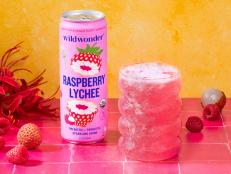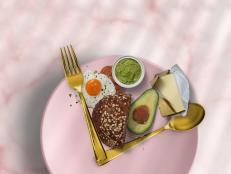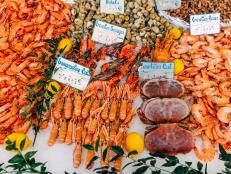The Dos and Don'ts of Dining Out: Food Allergy Edition

If you — or a friend — have a food allergy, you know eating out is no piece of cake. But with an ever-increasing number of diners with serious allergies and intolerances, restaurants are taking food safety seriously. We asked three of New York City’s top chefs and a seasoned restaurant food writer to weigh in on the new etiquette of dining out with food allergies so that everyone has a positive dining experience and a great meal to remember.
Q. Should restaurants accommodate diners with food allergies?
A. “Yes, of course,” says Carmen Quagliata, executive chef and partner in Union Square Cafe. “It’s our way of doing whatever we can for people, within reason — and the reason boils down to manpower and ingredients available.” Mark Ladner, executive chef of Del Posto, puts it more universally: “We do our best to accommodateeveryone.” Food writer Jacqueline Raposo, who has worked with more than 150 chefs nationally for sites like Tasting Table and Serious Eats, says many restaurants these days are well versed in how to serve up allergy-safe meals: “Restaurants are being proactive and making sure their staff knows the details about food allergens in ingredients, especially those not made in-house. They know if the sprinkles on sundaes were made in a factory on shared equipment, or if someone orders gluten-free waffles and fries they make sure to point out that they have shared fryers.”
Q. Do you have any pet peeves when it comes to diners with food allergies or intolerances?
A. “As a rule, no guest’s goal is to screw a restaurant,“ say Floyd Cardoz, executive chef and partner in White Street Restaurant, adding, “As long as guests have dietary restrictions, I’ll look to accommodate them. I like to be on the guest’s side and proactively ask them if they have any restrictions when we take an order.” Chef Quagliata’s impression? “We take food allergies very seriously for the safety of our guests, and when someone uses it as a way to customize their dishes around any aversions they have — for example, if someone simply dislikes garlic and says they are allergic to it — it’s unfortunate, because we can absolutely work around any aversion without taking the extra precautions we must around an allergy, which is a medical situation that requires a whole extra level of safety.”
Q. What steps should a diner take before arriving at a restaurant if she has a food allergy, to make it easier for the restaurant to accommodate her dietary needs?
A. Basic etiquette would be to read the menu ahead of time, then when you call to make a reservation, let the restaurant know about your specific food allergies. “As always, information is power,” says Ladner. “A heads-up is very helpful. Tell us what you can eat.” Quagliata adds, “Have a list of your food allergies written down and ready to hand to a server when you first sit down.” Ultimately, who bears responsibility for a food-allergy-safe dining experience? Raposo believes it falls in the hands of the diner. “Someone who has a food allergy is going to be very good about clearly expressing it, because they’re truly worried that their life or health is in the hands of another,” says Raposo, adding that “food-allergic diners don’t want that responsibility to wrongly fall on the hands of a cook or server because they weren’t well-informed.” She recommends speaking up before making a reservation. “If it’s a severe allergy, ask serious questions,” she says, “like if they sanitize equipment before cooking for those with food allergies.”
Q. Do you think restaurant menus should designate which common allergies are not in a dish, with labels like GF, DF, egg-free, etc., or even have a separate menu?
A. Quagliata doesn’t think so. “We believe in a one-size-fits-one approach to all of our guests, and this allows us to have a conversation to customize the experience and ensure that the necessary precautions are taken.” Ladner agrees, “We prefer to handle this verbally rather than printing on the menu.”
Q. How can restaurants make accommodating food-allergic diners easier for kitchen staff?
A. “The best way to prepare is to be prepared, rather than running around trying to freestyle when people invariably ask for off-menu items or amended preparations,” says Ladner. Chef Quagliata agrees, “We always have at least soy and almond milk on hand. We also have a great artisan brand of gluten-free pasta in-house called Rustichella d’Abruzzo. Most of our food is prepared a la minute anyway, so that also makes it easier for us to accommodate food allergies.”
Q. How far should restaurants go to ensure no cross-contamination?
A. Every restaurant goes to a different degree of safety. Ladner spends a lot of time educating and testing his staff on food allergy safety. He also recently installed Allergen Saf-T-Zone systems — a color-coded basic prep set of cooking tools housed in its own case to designate food allergy zones at each kitchen prep station. Quagliata takes a different approach: “We create the time and focus for a kitchen staff member to go through the requests with the server. The first step is to immediately assign one person to stop and go through each ingredient in the recipes of each dish ordered. Then, we assign one sous chef in charge of preparing all of that person’s food for the meal and use separate sterile cutting boards, bowls, utensils, etc. on a separate table that is not in proximity to the ingredient(s) that the person is allergic to.”






























































